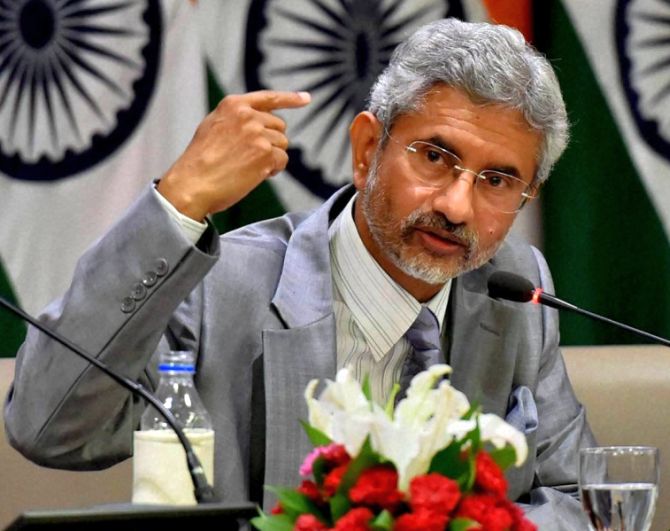1962 conflict damaged India's standing: Jaishankar
November 15, 2019 00:14

Asserting that past handling of Pakistan raises many questions, external affairs minister S Jaishankar on Thursday said the 1972 Simla agreement resulted in a "revanchist" Pakistan and continuing problems in Jammu and Kashmir, as he hailed Prime Minister Narendra Modi's "bold moves" in dealing with the neighbouring country.
The minister also said that "holding the feet to the fire" is very important in dealing with Pakistan and asserted the neighbouring country has built "an industry of terror".
Delivering the fourth Ramnath Goenka memorial lecture, Jaishankar advocated a foreign policy that appreciates change and is not status quoist as he cited key past incidents in Indian history such as the defeat in the war with China in 1962, the Simla agreement, the "inaction" after the Mumbai terror attacks to contrast it with India's more dynamic stance post-2014.
Giving a historical perspective to geopolitical issues, Jaishankar said, "For years India's position on the world state seemed assured, but the 1962 conflict with China significantly damaged India's standing."
"India's record includes dark moments like the 1962 defeat against China. Or tense ones like the 1965 war with Pakistan. There are enough dichotomies in our past to generate a spirited debate on successes and failures," the minister said.
"Two decades of nuclear indecision ended dramatically with the tests of 1998. The lack of response to 26/11 is so different from the Uri and Balakot operations. Whether it is events or trends, they all bear scrutiny for the lessons they hold," he said.
Jaishankar asserted that the purposeful pursuit of national interest in shifting global dynamics may not be easy, but it must be done.
The real obstacle to the rise of India is not anymore the barriers of the world, but the dogmas of Delhi, he said in his lecture on the topic 'Beyond the Delhi Dogma: Indian Foreign Policy in a Changing World'.
"There was also little awareness in the 1950s that we were dealing with a battle-hardened neighbour to the North. Or of the strategic significance of Pakistan-occupied Kashmir. This approach to world affairs continued even thereafter," Jaishankar said while explaining six phases in Indian foreign policy.
"Thus, in 1972 at Shimla, India chose to bet on an optimistic outlook on Pakistan. At the end of the day, it resulted in both a revanchist Pakistan and a continuing problem in Jammu & Kashmir," he said.
The Simla Agreement was signed by then Prime Minister Indira Gandhi and Pakistan President Zulfikar Ali Bhutto in 1972 seeking to reverse the consequences of the 1971 war.
It was a comprehensive blue print for good neighbourly relations between India and Pakistan. -- PTI





 © 2024 Rediff.com -
© 2024 Rediff.com -